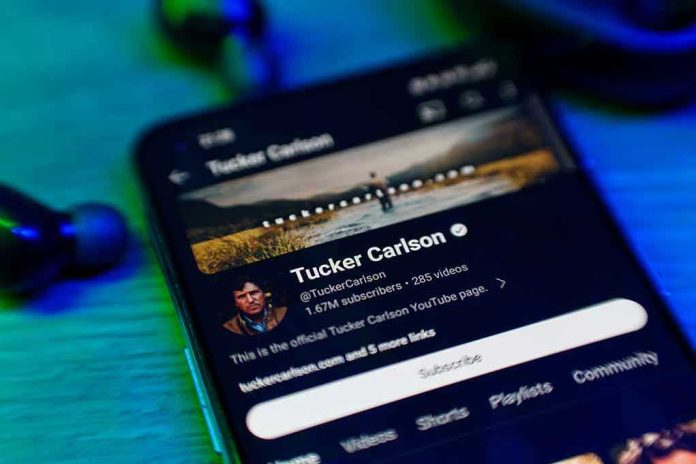
When a top conservative broadcaster tells his critics to “buzz off” after interviewing a notorious white nationalist, the real story is about who gets to set the boundaries of public debate—and what happens when those boundaries are ignored.
Quick Take
- Tucker Carlson defends interviewing Nick Fuentes, dismissing critics on Megyn Kelly’s show.
- The controversy spotlights the ongoing debate over “platforming” extremist figures in media.
- Carlson and Kelly leverage their independence from legacy media to shape the conversation.
- The uproar may redefine media norms and the role of independent journalists in polarized times.
Carlson’s Calculated Defiance: A New Media Flashpoint
Tucker Carlson’s appearance on Megyn Kelly’s show, just days after his interview with Nick Fuentes, ignited a storm that crackled across cable, podcasts, and social media. Carlson, never one to wilt under pressure, fired back at his critics with a simple directive—“buzz off.” The message wasn’t just for his detractors; it was a shot across the bow of the entire media ecosystem. By refusing to apologize, Carlson set a new standard for how high-profile independent journalists can—and will—deal with outrage when it comes to interviewing the most controversial voices in American politics.
His defense went beyond ego. Carlson argued that interviewing even the most extreme figures is not only legitimate but necessary for a functioning society. He claimed that open dialogue, not censorship, is the best tool for understanding and ultimately countering dangerous ideologies. That stance put him in direct opposition to critics who argue that “platforming” people like Fuentes risks normalizing hate. The friction between these camps exposes a central tension in modern journalism: Who gets to decide what ideas are too toxic for public consumption?
The Debate Over “Platforming” Extremists Isn’t New—But the Stakes Are Higher
The question of whether to interview—or ignore—extremist figures has haunted American media for decades, from the days of radio demagogues to the rise of cable news. What’s different now is the collapse of traditional gatekeeping. Carlson, once tethered to Fox News, now operates free from corporate constraints. Megyn Kelly, similarly liberated, uses her platform to surf the waves of controversy rather than avoid them. This independence allows both to spotlight issues mainstream outlets might sidestep, but it also means they bear the full weight of their editorial decisions—good or bad.
Nick Fuentes, whose “America First” movement is widely characterized by white nationalist rhetoric, gains from any mainstream attention. For critics, this is the problem: every interview is a victory for the extremist, a chance to reach new audiences and claim legitimacy. Supporters of open dialogue see it differently. They argue that sunlight is the best disinfectant, and that challenging extremists in the open is more effective than banishing them to the shadows. The stark divide in these viewpoints drives the current uproar and ensures it won’t be the last.
Echoes of Past Media Firestorms—and What’s Different This Time
Past interviews with figures like Alex Jones or Richard Spencer sparked similar soul-searching in newsrooms and among viewers. But Carlson’s approach stands out for its unapologetic tone. He doesn’t just tolerate criticism; he courts it, using controversy to fuel his brand and rally his audience. Kelly, for her part, positions herself as a facilitator of hard conversations, refusing to cede ground to critics who accuse her of enabling hate. Together, they represent a new breed of independent media personalities—untethered, unfiltered, and unbothered by legacy norms.
This shift matters because it comes at a time when trust in institutions is at an all-time low and audiences are fragmenting along ideological lines. The old rules about who should or shouldn’t get a platform are breaking down, replaced by a marketplace where attention is the ultimate currency. For some, this is a positive development: difficult questions get asked, hidden beliefs are exposed. For others, it’s a dangerous game that risks making the fringe mainstream.
Media Ethics in the Age of Maximum Polarization
Media ethicists warn that, even with the best intentions, interviewing extremists can backfire. The risk is that exposure, even critical, provides validation to those whose views are fundamentally outside the bounds of civil discourse. Academic experts draw a line between “platforming”—amplifying a voice—and “scrutinizing”—challenging it. But in practice, that line is blurry, and much depends on how the interview is conducted and received.
For Carlson, the line is clear: refusing to engage with controversial voices is a greater threat than the risk of accidental legitimization. For his critics, the opposite is true. The fallout from this latest episode will reverberate through media circles, advocacy groups, and the broader public. Advertisers may reassess their support; audiences may become even more polarized. The only certainty is that the debate over who gets heard—and who decides—will not fade any time soon.
Sources:
The Megyn Kelly Show podcast (Apple Podcasts)




